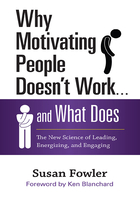
The Problem with Feeding People Motivational Junk Food
You buy dinner for your family at the local drive-through—burgers, fries, and shakes—with the intention of eating it at home together. The aroma of those fries is intoxicating. You simply cannot help yourself—you eat one. By the time you get home, the bag of French fries is empty.
Consider the effect junk food has on our physical and mental energy. How do we feel after downing the package of French fries? Guilty or remorseful? Even if we feel grateful and satisfied, what happens to our physical energy? It spikes dramatically and falls just as dramatically. How nourished are our bodies? A steady diet of junk food simply isn't good for us. Even if we can justify an occasional splurge, we are wise to understand our alternative choices.
Parents, teachers, and managers promise more money, award prizes for contests, offer rewards, threaten punishment, apply pressure, and use guilt, shame, or emotional blackmail to encourage specific behaviors from children, students, and employees. When people give in to one of these tactics, they end up with a suboptimal motivational outlook—disinterested, external, or imposed. But, those rewards and punishments (carrots and sticks) are as hard to resist as those French fries—and just as risky.
Here's a case in point. You receive an invitation from your health insurance provider to lose weight and win an iPad mini. You think, What do I have to lose except some weight? What do I have to gain except health and an iPad mini? Think again.
A recent study followed people who entered contests promising a prize for losing weight. They found that, indeed, many people lost weight and won their prize. However, these researchers did something that others had not done. They continued to follow the behaviors and results of the prizewinners. What they found reinforced vast motivational research findings regarding incentives. Within twelve weeks after winning their prize, people resumed old behaviors, regained the weight they had lost, and then added even more weight! Financial incentives do not sustain changes in personal health behaviors—in fact, they undermine those behaviors over time.
Rewards may help people initiate new and healthy behaviors, but they fail miserably in helping people maintain their progress or sustain results. What may be more disturbing is that people are so discouraged, disillusioned, and debilitated by their failure, they are less likely to engage in further weight-loss attempts.
So why do over 70 percent of wellness programs in the United States use financial incentives to encourage healthy behavior changes?
• If people participate, without perceived pressure, in a weight-loss program offering small financial incentives, there is some likelihood they will lose weight initially. However, studies reporting these weight-loss successes were conducted only during the period of the contest. They didn't track maintenance. “The rest of the story” is one that most people have not heard.
• Financial incentives are easy (if expensive to offer). Organizations have not taken the time to create more innovative, healthy, and sustainable options.
• People have come to feel entitled to receive incentives, and organizations are afraid to take them away. Why do leaders keep promoting junk-food motivation to entice people to achieve goals or adopt certain behaviors?
• Many leaders simply don't question common practices.
• Leaders have not gained an awareness of the skill to apply the science of motivation to facilitate people's shift to a more optimal and sustainable motivational outlook.
• People don't understand the nature of their own motivation, so when they are unhappy at work, they ask for more money. They yearn for something different—but they don't know what it is—so they ask for the most obvious incentive: money. Managers take the easy way out and assume that since they can't comply with people's requests for more money, their hands are tied.